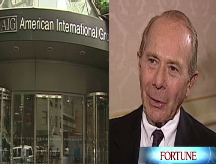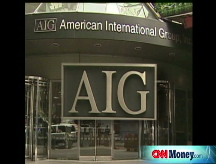AIG to focus on property, casualty business
Troubled insurance giant says sale of other assets will allow to pay off $61 billion in loans from the Federal Reserve.
NEW YORK (CNNMoney.com) -- The beleaguered insurance giant AIG announced plans Friday to hold onto its property and casualty insurance businesses, while selling off the rest of the company to pay its massive debt to the federal government.
American International Group (AIG, Fortune 500) said it also would retain a majority stake in its foreign life insurance operations.
Everything else is on the table, said Chief Executive Edward Liddy, who was installed by the Federal Reserve last month after it gave AIG an $85 billion loan. Other businesses include its aircraft leasing unit, asset management division, retirement services and U.S. life insurance operations.
Liddy gave an upbeat presentation to analysts, saying the company will end up strong and nimble after the asset sales.
"We fully expect to emerge from this with a capital structure that's fit to fight," said Liddy in a conference call, noting the property and casualty businesses generated $40 billion in 2007 revenue. "Our insurance businesses...are strong and well-capitalized. Our policyholders are secure."
Liddy said the company has "already been contacted by numerous strong, stable parties, and we expect that buyers will recognize the value of these properties."
He did not provide a price estimate, but noted the $700 billion government bailout of troubled assets will help stabilize the firm.
The goal is to divest these units in larger transactions to brand-name companies, he said. If AIG gets good bids, it will sell fewer assets.
Potential bidders include Berkshire Hathaway, Allstate, State Life, MetLife and Manulife, as well as some European insurers, said CreditSights, a debt analysis firm.
First to hit the market will likely be units tied to airline leasing and consumer lending, both of which require funding from the debt markets, which is hard to come by these days.
International Lease Finance Corp. could command more than $7 billion and American General Finance Corp. will likely bring in about $2 billion, according to CreditSights.
While Liddy was very reassuring on the call, some analysts said his talk was mainly hype. As the financial turmoil continues, it's hard to say how successful the asset sales will be.
"They don't know what they are going to get," said David Schiff, founder of Schiff Insurance Observer, a newsletter.
Ratings agency Standard and Poor's wasn't impressed either. It placed AIG and its guaranteed subsidiaries in its financial-services division - such as the airline leasing company - on CreditWatch negative.
"The current disruption in the credit markets could make it difficult to sell businesses at attractive valuations," S&P said.
CreditSights valued the units AIG planned to sell at $32.9 billion and the divisions it will keep at $86 billion. These figures do not include the sale of a minority stake in its foreign life insurance operations, valued at $133.1 billion.
Once AIG sells its assets, it faces many hurdles in stabilizing its property and casualty insurance divisions. Customers are already fleeing and rivals are swooping in, experts said.
"The next challenge will be getting the core insurance business back on track, keeping the existing business and bringing in new customers," said Stewart Johnson, portfolio manager with Philo Smith, an investment bank. "Given the competitive nature of the industry, it will be tough without giving incentives."
AIG said it has drawn $61 billion in credit from the Federal Reserve as of Sept. 30. About $54 billion of it went to boost collateral at its troubled securities lending business, which is being wound down, Liddy said.
AIG's stock rose more than 20% - to just under $5 - in afternoon trading Friday.
AIG's downfall was due in large part to a small financial services unit in London, which prospered for years issuing credit default swaps, which insure against corporate debt defaults. With the global titan on the brink of bankruptcy a day after being downgraded by credit rating agencies, the Fed stepped up with a $85 billion loan carrying a steep interest rate, currently 12.83%. In exchange, the government took control of nearly 80% of the company.
The purpose of the loan, according to the Fed, was to help AIG to sell off its $1.1 trillion worth of assets in an "orderly manner, with the least possible disruption to the overall economy." And with the financial industry in chaos, the company needs the time so it won't have to divest at firesale prices.
Based on the call, Liddy clearly intends to keep the company operating. In a nod to past complaints of AIG's radio silence during troubled times, Liddy promised the company would be more forthcoming about its plans.
"Our communications and transparency will be second to none going forward," he said.
CNNMoney.com Staff Writer Aaron Smith contributed to this report. ![]()






